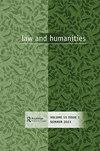诗歌、抗议与环境:尼日利亚文学中的人权与非人权
IF 0.3
Q3 LAW
引用次数: 0
摘要
尼日利亚英语诗歌自诞生以来,一直具有抗议性质。在审美范围之外,它还对困扰这个国家的社会政治和环境问题提出了批评。本文探讨的就是这种文学工具主义;生活在尼日利亚的尼日利亚作家将诗歌作为反对侵犯人权和环境权利的工具。所采用的理论框架是从非洲抗议写作的概念和后殖民生态批评的思想中得出的。这将提供一个背景,在当代尼日利亚失败的本土政府和跨国资本主义的重压下,将人类和非人类的命运联系在一起。本研究将追溯尼日利亚文学和政治事件的发展,然后对选定的诗歌进行文本分析。还将注意尼日利亚自殖民时期以来环境立法的增长。本文最后认为,在缺乏有效或实用的法律框架的情况下,诗歌仍然是强调侵犯人权和环境权利的最重要工具之一。因此,这项研究通过关注诗歌的社会维度——以及一般的艺术——以及文学在后殖民社会的环境危机中所扮演的角色,使当代学术受益。本文章由计算机程序翻译,如有差异,请以英文原文为准。
Poetry, protest, and environment: human and nonhuman rights in Nigerian literature
ABSTRACT Since its inception, Nigerian poetry in English has always been characterized by protest in nature. Beyond its aesthetic scope, it has been critical of socio-political and environmental problems that have bedevilled the nation. This paper is concerned with such literary instrumentalism; the use of poetry by Nigerian writers, living in Nigeria, as an instrument against abuses of human and environmental rights. The theoretical framework that is employed is drawn from the notions of protest writing in Africa and ideas of postcolonial ecocriticism. This will provide a context that brings the fate of humans and nonhumans together under the weight of a failed home government and multinational capitalism in contemporary Nigeria. This study will trace the development of literary and political events in Nigeria, followed by a textual analysis of selected poems. Attention will also be paid to the growth of environmental legislation in Nigeria since the colonial period. This article concludes by arguing that in the absence of an effective or practical legal framework, poetry remains one of the most significant instruments for highlighting the violation of human and environmental rights. As such, the study benefits contemporary scholarship by drawing attention to the social dimension of poetry – and the arts generally – as well as the role literature plays in foregrounding environmental crises in postcolonial societies.
求助全文
通过发布文献求助,成功后即可免费获取论文全文。
去求助
来源期刊

Law and Humanities
LAW-
CiteScore
1.00
自引率
0.00%
发文量
21
期刊介绍:
Law and Humanities is a peer-reviewed journal, providing a forum for scholarly discourse within the arts and humanities around the subject of law. For this purpose, the arts and humanities disciplines are taken to include literature, history (including history of art), philosophy, theology, classics and the whole spectrum of performance and representational arts. The remit of the journal does not extend to consideration of the laws that regulate practical aspects of the arts and humanities (such as the law of intellectual property). Law and Humanities is principally concerned to engage with those aspects of human experience which are not empirically quantifiable or scientifically predictable. Each issue will carry four or five major articles of between 8,000 and 12,000 words each. The journal will also carry shorter papers (up to 4,000 words) sharing good practice in law and humanities education; reports of conferences; reviews of books, exhibitions, plays, concerts and other artistic publications.
 求助内容:
求助内容: 应助结果提醒方式:
应助结果提醒方式:


